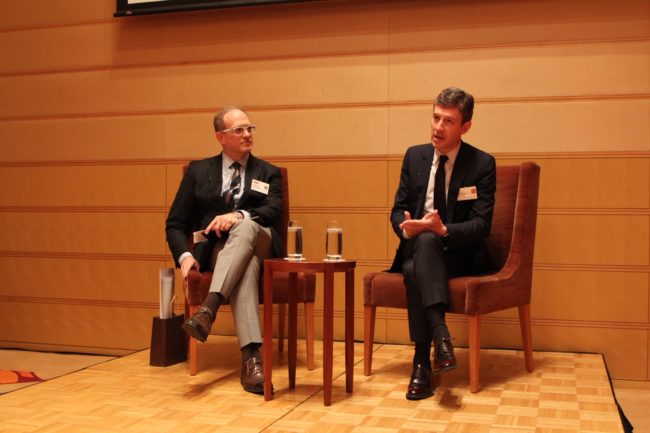[:en]On February 5th, I conducted an on-stage conversation with LVMH Louis Vuitton Moët Hennessy Japan President, Norbert Leuret, for both the American and French Chambers of Commerce at the Tokyo American Club. Here are my takeaways from that conversation.
- Japan is a center of innovation and inspiration. Much of LVMH’s product innovation comes from artisans from all over Japan, creating distinct materials for textiles, metals, wood, and other products unmatched anywhere else in the world—so much so that LVMH has established a local group in Japan for seeking out opportunities and fostering collaboration.
- Japan is in a second boom period that is not unlike the post-war economic miracle—driven by a high-degree of savings and a desire to spend.
- Make no mistake, millennials are happy to spend money on good products that last.
- Luxury is about how a product makes you feel. Great products that last and give you pleasure, whether a physical item or the memory of an experience, are what luxury is all about. It’s not just about the cost.
- A country’s consumers go through an evolution when it comes to luxury goods. First, it is about a consumer’s desire to show others that he or she is successful. In this case, the choice of product conforms to a specific, recognizable image among a large group of people. In a more mature stage, a consumer buys a luxury product for his or her own pleasure, regardless of what others think. In this case, the consumer is looking for a luxury product that is distinct. The Japan market has matured in the last twenty or thirty years.
- What makes Japan’s luxury market distinct from markets elsewhere in the world is the level of research that consumers do. They know the products extremely well, and sales staff must be just as, if not more, deeply versed than customers. Educating staff is more of a challenge in Japan.
- The idea that the Japanese are reserved and don’t show emotion is a myth. You get any Japanese talking about something for which he or she has a passion and you will see that passion just like you would with anyone from anywhere else in the world.
- In luxury, a dissatisfied customer will never return. This is different from businesses like airlines and insurance where dissatisfied customers make repeat purchases anyway.
- To be successful in the luxury business, you need passion. You can tell who has passion because such people have a curiosity about the outside world and diverse interest well beyond work.
[:ja]去る2月5日に、東京アメリカンクラブにおいて、在日アメリカ商工会議所および在日フランス商工会議所の共催による、LVMHジャパン株式会社代表取締役社長、ノルベール・ルレ氏へのインタビューを行わせていただきました。このインタビューから私が学んだことをここにシェアさせて頂きたいと思います。
- 日本はイノベーションとインスピレーションの中心である。LVMH社の製品の製品イノベーションの多くも日本各地にいる職人の方々によるもので、彼らは繊維や金属、木、その他の製品に使われるユニークな素材を創り出してくれている。それは世界中のどこのものと比べても素晴らしいものであり、故に、LVMHも日本に現地グループを作り、彼らと共に仕事をする機会を探したり、協力し合える関係を培っている。
- 日本は戦後の奇跡的な経済成長とも似た、第二の好景気の真っ只中にいる。それは貯蓄額の高さと消費への欲に後押しされているものである。.
- 誤解している人もいるようだが、ミレニアルたちは長持ちする良質の商品であれば、それに金銭を使うことを惜しみはしない。
- 高級とは、ある商品によってあなたがどう感じるか、ということである。商品にせよ何か体験したことの思い出にせよ、長持ちしあなたに喜びを与えてくれる素晴らしいものこそ、高級と呼べる。それに付けられた値段など、関係ない。
- 国内の消費者の高級品に対する態度は変わっていくものである。最初はそれによって自分が成功していることを人に見せたい、というところに基づいている。この場合、製品の選択は、多くの人々の間で認識されている特定のイメージに沿ったものとなる。これがさらに進んだ段階では、消費者は自分が楽しむために高級品を購入し、周りの人がそれをどう見るかといったことは関係なくなってくる。そうなると、消費者はユニークなものを求めるようになる。日本市場の場合、この20〜30年でこの進んだ段階に移ったと言える。
- 日本の高級品市場が他国の市場と大きく違っている点は、消費者が行うリサーチのレベルであろう。彼らの商品知識はかなり高いので、営業スタッフもそれと同じ位か、それ以上に商品に詳しくなくてはならない。故に、日本ではスタッフの教育が大きな課題である。
- 日本人はおとなしく、感情をあまり表さない、というのは事実ではない。日本人が自分が夢中になっていることを話し始めると、海外の人々と同じように、情熱が伝わってくる。
- 高級品の世界では、不満を抱いた顧客は必ず離れていってしまう。航空産業や保険業界では、不満を感じている顧客がまた購入を行ったりするものだが、高級品市場ではそういうことはない。
- 高級品ビジネスで成功するには、情熱が必要だ。情熱を持った人は外界にも興味をもち、仕事以外にも多様な趣味を持っているので、すぐにわかる。
[:]



